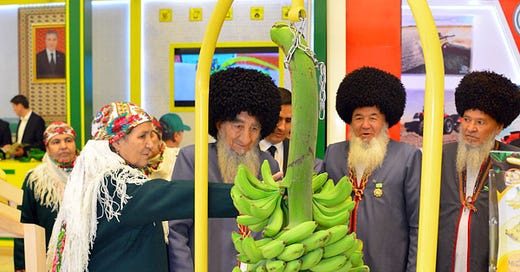Bananas in the desert
Despite its alleged indifference to the fruit, Turkmenistan aspires to become a regional banana power. What does this admittedly niche fact signify for the future of global trade?
People in Turkmenistan very seldom eat bananas.
Turkmens on average consume a paltry 160 grams of the fruit per year, according to analysts at East-Fruit, a website covering the produce industry.
That puts the country in last place in global banana consumption.
This discovery was enough for one outlet to allude waggishly, if a little confusingly, given the…
Keep reading with a 7-day free trial
Subscribe to Havli - A Central Asia Substack to keep reading this post and get 7 days of free access to the full post archives.





